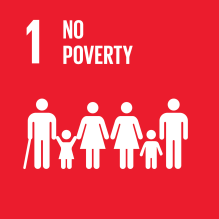
No Poverty
Ending all types of poverty for everyone.
By reducing the number of people living in poverty, we build their resilience and reduce their exposure and vulnerability to climate-related extreme events and other shocks and disasters. Access to microfinance and social safety nets are a few tools in doing this. Social work, urban planning, public health, economics and so many other fields are vital in combating poverty.
Blueprints for Belonging [1:32:18]
Internationally recognized civil rights and civil liberties expert john a. powell delivers “Blueprints for Belonging: Exploring the Role of Planning and Design in Building Equitable Communities” on February 8, 2017, at the University at Buffalo School of Architecture and Planning. Exploring issues through the lenses of race, gender, sexual orientation, disability and socioeconomic status, Powell discusses how structures and systems interactively link issues across domains to produce exclusion and offers possibilities for dismantling structural racism, challenging unconscious bias and supporting inclusive, responsive government.
The Economics of Urban Segregation
Dr. Henry Louis Taylor Jr. from Architecture and Planning talks about the economics of urban segregation on UB Social Work's podcast series. (4/10/2017)
Fair Housing in Buffalo's Suburbs
Urban and Regional Planning Professor Kelly Patterson discusses fair housing in Buffalo's Suburbs on the Partnership for the Public Good's podcast July 5, 2011.
Basic income: An Anti-Poverty Strategy for Social Work
Dr. James Mulvale explains the idea of a basic income on the School of Social Work's podcast. He offers reasons for instituting a basic income and reviews some of the typical objections. Dr. Mulvale also provides a rationale for why this is an anti-poverty model that social work should embrace. (4/13/15)
The Impact of Student Loan Debt on Subjective Well-Being: Examining the Role of Economic and Non-Economic Factors
Katrina Cherney discusses her research on the UB School of Social Work's podcast examining the relationship between student loan debt and subjective well-being over time, and how student loan debt is stratified across the socioeconomic spectrum and compounds inequalities and disparities.
She summarizes the history of student loans and their role in financing education, describes the concept of the dual quality of debt and considers the implications of the growing student loan debt crisis for social work practice, specifically and for practice and policy.
Sustainable Courses
- END 406: Housing & Community Development.
- URP 508: Race, Class, & Gender.
- URP 522: Economic Development Planning.
- GGS 241: Women in Developing Countries.
- HIS 143: Global Inequality & Power.
- PHI 335: Contemporary Ethical Theory.
- SOC 331: Wealth & Poverty.
- SOC 332: Sociology of Work.
- SOC 358: Sociology of Food.
- SOC 362: Families & Inequality.
- LAI 526: Agencies & Services for Children
- ELP 543: Economics of Education
- ELP 543: Economics of Education.
- LAI 526: Agencies & Services for Children.
- ES 102: Fundamentals of Wellness.
Donate time to service projects focused on addressing poverty in your community and those organized by your employer. Visit UB Student Engagement office or Volunteer WNY for some ideas on where to start.



